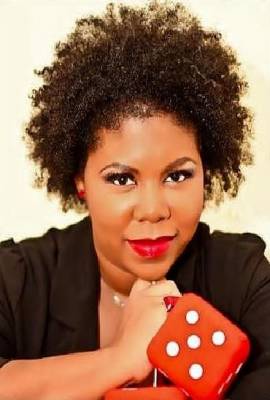Mahogany Keys: The Complex Image of the African American Woman part 5
Interview with Davida Green-Norris – Attorney and Published Author
A successful lawyer, Davida also writes under the pen name Dicey Grenor. She authored Shameful (Taboo fiction) and (The Narcoleptic Vampire Series): Sleepy Willow's Bonded Soul (Vol. 1), Sleepy Willow's Heartless Soul (Vol. 2) and Sleepy Willow's Loosed Soul (Vol. 3)
Growing up in a small North Carolina town gave Dicey plenty of time to dream of Hollywood and vampires. She loved escaping in great movies and fiction books, and discovered she wasn't bad at writing either. But she didn't think that was going to pay the bills or that anyone would take her seriously. However, her passion along with the hard work makes her one of the most respectable African American authors.
Oana: Davida, what is the importance of the family in your life?
Davida Green-Norris: It is the most important thing to me. My husband and my children are more than just my responsibilities. They are my motivations to be the person I am, and to strive to be better. The smiles on their faces make it all worthwhile.
Oana: Would you say that the fact that you are an African American woman influenced the way you were treated throughout your life (school, workplace)?
Davida Green-Norris: Throughout my high school years, I went to a private school where I was one of the only few blacks there. Out of about four hundred students, I was one of six. In my graduating class of fifteen, I was the only one. You doggone right, my race and culture influenced the way I was treated. In the workplace, I have very specific incidents that I could point to that I felt were specific to race. Some were due to personality clashes. I can’t say every negative experience was influenced by what I look like, but there were times when I didn’t doubt that was the cause of adverse treatment.
Oana: Have you had extremely negative experiences involving racism and how did they affect you?
Davida Green-Norris: I’ve had very negative experiences involving racism. It only inspired me to be even better. I think initially I thought it would help me be more accepted. Then I realized that was a foolhardy dream. Racism is not spurred by rational thought. People, who are ignorant enough to allow a person’s skin color to influence how they feel about another, won’t care if I’m a professional with excellent credentials, live in a nice neighborhood, drive a fancy car, or dress neatly. In fact, I had a Caucasian girl tell me that her father wouldn’t care if I were the President of the United States, I’d still be black, and therefore, he wouldn’t want her to hang out with me. I was in grad school, able to afford the same lovely apartment she was, and that’s what she said. My point is, somewhere down the line, I realized racism didn’t spur me to strive harder to become more in order to be more accepted. It helped me to aspire to be more in spite of NOT being accepted. I had an “eff ‘em” attitude. Someone may not like me for silly reasons, but they won’t be able to do a dang thing about it.
Oana: Have you ever felt that your ideals and goals have been put on hold because society has assigned you a different task or even (undeserved) punishment?
Davida Green-Norris: Nope. My tenacity and stubbornness have made me make a way when there seemed to have been none. My ideals and goals may have been delayed. I may have had to work harder. But nothing has stopped my show.
Oana: Do you believe in God? What do you think about the fact that black people and white people rarely meet in churches when we are told we are all “children of God”?
Davida Green-Norris: I do believe in God. I think it’s ridiculous to have “segregated” churches. I don’t know how anyone could think that would represent the “body of Christ.” That being said, I think people attend wherever they feel most comfortable with people they feel most comfortable around. There are cultural differences that people may want to avoid, like style of music or preaching versus teaching styles. They may not be selecting a church based on race per se. My family happens to attend a mixed cultural/race church, where the pastor is white. We have every race, age, size, and class you can think of. I prefer it that way…even though the music is not my most preferred genre.
Oana: Do you believe that African American women’s rights should be part of a general greater movement that would include women of all races and ethnicities or they should be addressed separately?
Davida Green-Norris: Anything that is called “African American women’s rights” should include women who identify themselves as African-American. Though the same issues may affect all women, AA women may want to address issues from the viewpoint of AA women. For instance, breast cancer awareness is a cause that affects us all. But more specifically, according to Centers For Disease Control and Prevention: “Black women have the highest breast cancer death rates of all racial and ethnic groups and are 40% more likely to die of breast cancer than white women. The theories listed in that article about why this is the case, tell me that we need to take extra steps in breast cancer awareness within our specific community AND we may need to address the issue differently than we would to women overall. There are even worse stats when it comes to the spread of HIV/AIDS amongst black women. Should all women be educated on health and safety? Yes. Should black women address health and safety separately, and more specific to themselves? Yes. When it comes to rights, I feel the same thing may apply because of the issues even more specific to our community. All women may have the RIGHT to access good healthcare, but our experiences related to healthcare personnel may be very different from that of a white woman, and therefore, our rights to it may need to be addressed separately.
Oana: Many African American woman follow fashion trends which sometimes triggers a very negative response in the black community. Do you think that a hairstyle can change who one is?
Davida Green-Norris: No. The hairstyle doesn’t change the person. Seeing more women accept their hair textures and wear hairstyles that were once not considered beautiful because of those hair textures, may give a woman the confidence to be herself that she wouldn’t ordinarily have. I don’t like to follow trends, but I love that black women are becoming more satisfied with their natural grown hair and not allowing society to dictate what the standard of beauty is. I’m happy to be part of the el naturale trend. I just hope it goes beyond being “trendy” and becomes a heartfelt self-esteem booster for generations to come.
Oana: What are the most sensitive issues the African American woman encounters frequently and that are invisible to the white people’s eyes? What should we be more aware of?
Davida Green-Norris: I think my answer to the last question may fall here. The standard of beauty—straight hair, fair skin—is something that has been damaging to our community for the longest. This affects how black women view themselves when they look in the mirror, and it affects how all men view us. It shouldn’t, but it does, because we are all influenced on some level by what we see in the media. I am happy to say that I’ve seen a change in media depictions within the last year though. I hope it continues, and it not just a fad.
Oana: What is the significance of the African American woman’s work in today’s society?
Davida Green-Norris: As significant as any other. We need hard and smart workers and positive role models just like any other group.
Oana: What is your advice for the young generation of African American women?
Davida Green-Norris: Be yourself. Love yourself. Life will be hard, but if you keep these two things in mind, you will make better choices, and you won’t have regrets.
Oana: In an earlier conversation you mentioned the topic of sexuality in the black community as one that is somewhat taboo. Why is that?
Davida Green-Norris: I think it has a lot to do with blacks and religion. At some point, folks got it in their head that S-E-X was bad. It’s a sin. Where’s the fun in that, if anytime you think of sex, you think of it (and related words) as dirty and something that should be avoided at all costs? I see that as crippling ideology. It makes us uptight…and dare I say, hypocritical. Uptight in public. Hypocritical, because of how we behave in private. Folks are always quoting scriptures about how sex is wrong—misquoting, I believe—and missing the bigger picture. Sex is supposed to be a good thing to help us connect on a deeper level with our spouses. Promiscuity has its own issues, but sex in and of itself is not bad. Likewise, I don’t think talking about it, reading about it, or watching a scene or two in a movie is bad either. I see it more and more every day, where violence is acceptable. We can watch someone get their head chopped off, but the world is coming to an end if someone shows a boob onscreen. Wow, that’s backwards. We’re grown folks. Lighten up about the topic…or at the very least, stop condemning others who have a lighter attitude about it. Even if someone feels their viewpoint on sexuality is the right view, I don’t understand why it should be imposed on others. Restrict the exposure to children, of course, but we may have less teens rebelling by trying out whatever’s so taboo, if it’s not made into such a “bad” thing in the first place. Just my two cents.
Oana: Thank you, Davida.
Davida Green-Norris: No, thank YOU, Oana
You can find out more about Davida here:
Website: www.DiceyGrenorBooks.com and www.norrislawyers.com
Blog: http://diceyblog.wordpress.com
FB page: http://facebook.com/DiceyGrenor and http://www.facebook.com/NorrisLawyers
Twitter: @DiceyGrenor and @norrislawyers
Goodreads: http://goodreads.com/DiceyGrenor
You can email Davida at
To find out more about Oana visit her author’s website at www.thehealings.net
© 2013 by Oana
When you subscribe to the blog, we will send you an e-mail when there are new updates on the site so you wouldn't miss them.



Comments